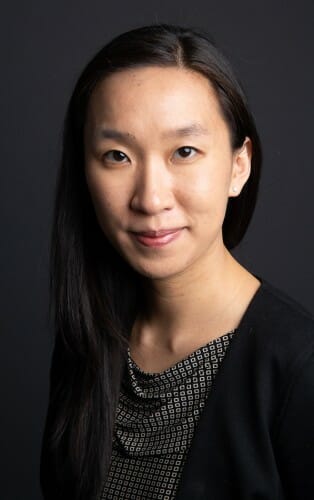ProPublica’s Caroline Chen is UW–Madison’s fall Science Journalist in Residence
For the next two weeks, Caroline Chen will virtually visit the University of Wisconsin–Madison campus as the fall 2021 Science Journalist in Residence.
Chen will visit several undergraduate and graduate-level courses in a virtual format the final week of October and the first week of November. On Nov. 2 at 7 p.m., she will headline a free, hybrid in-person/virtual panel discussion with UW–Madison experts as part of the Crossroads of Ideas public lecture series.
In the discussion, “COVID-19 and a Deluge of Data,” Chen, mathematics Professor Jordan Ellenberg, life sciences communication Professor Dominique Brossard, and population health sciences Professor Ajay Sethi will engage in conversation about data and how we share it, how we consume it, and the difficulties we face when making sense of it, from navigating uncertainty to confronting an onslaught of misinformation.
Chen covers health care for ProPublica, and her work spans public health, the pharmaceutical industry, hospitals and health care regulators. She notes, however, that she always centers the patient experience in her reporting. Chen has spent much of the last 20 months covering the coronavirus pandemic for the investigative journalism newsroom.
In fact, Chen served as part of a team at ProPublica recognized as a finalist for the Pulitzer Prize in Public Service for its COVID-19 coverage. Her work, she says, has included a mix of investigative reporting alongside a lot of “deep-dive explainers,” especially around topics that people “had a lot of emotions about, but maybe didn’t understand.”
She’s also tackled health disparities and the ways in which the pandemic has exploited the United States’ most vulnerable people, including stories about the lack of reliable access to vaccination for people at highest risk and a failure of some states to address vaccine hesitancy in Black communities, despite initial high rates of skepticism.
Chen grew up in Hong Kong, where she experienced the 2003 SARS pandemic firsthand. In college, she majored in English and minored in math, and then earned her master’s degree from the Columbia School of Journalism. Today, she lives in Northern California.
Chen became a health care reporter at Bloomberg News and transitioned onto the biotech beat. There, she covered the 2014 Ebola outbreak in West Africa and the implosion of blood test maker Theranos. In 2017, she wrote a feature about a then-new start-up company that had created a personalized cancer vaccine.
The company was Moderna. Perhaps you’ve heard of them.
Chen, whose work spans public health, the pharmaceutical industry, hospitals and regulators, has spent much of the last 20 months covering the coronavirus pandemic for the investigative journalism newsroom ProPublica.
Chen joined ProPublica in 2018, and in 2019, her stories about a heart transplant program in New Jersey that was prioritizing metrics over patient care won the Livingston Award for local reporting, given to journalists younger than 35.
With colleague Riley Wong, she won the 2019 June L. Biedler Prize for Cancer Journalism in online/multimedia reporting for work focused on the under-enrollment of Black and Indigenous people in cancer clinical trials, even when those cancers disproportionately affect them.
Chen will bring that background and experience to her talk at the Crossroads of Ideas. She will virtually join the in-person UW–Madison panelists for a moderated discussion led by University Communications. Details about the in-person event, which will be held in the H.F. DeLuca Forum in the Discovery Building at 330 N. Orchard St. in Madison, along with registration for the virtual livestream, can be found at http://www.warf.org/event/crossroads-of-ideas-covid-19-and-a-deluge-of-data/.
“We are excited to have Caroline talk to students at UW–Madison,” says Pat Hastings, a distinguished faculty associate in the School of Journalism and Mass Communication who, with faculty associate Stacy Forster and members of the University Communication research communications team, coordinates the Science Journalist in Residence Program. “She brings a wealth of reporting experience from her years covering health care for ProPublica and other media, and her reporting on the coronavirus pandemic is extensive.”
The UW–Madison Science Journalist in Residence Program is a partnership between the journalism school and University Communications. It was founded in 1986 through the support of the Brittingham Trust and continues with support from the private, nonprofit University of Wisconsin Foundation.
Recent journalists invited through the program include Pulitzer Prize-winner Ed Yong of The Atlantic; Victor Cohn Prize for Excellence in Medical Science Reporting recipient and New York Times reporter Apoorva Mandavilli (then at Spectrum News); and Pulitzer Prize-winning journalist Mark Johnson of the Milwaukee Journal Sentinel.
Crossroads of Ideas is supported by the Morgridge Institute for Research, the Wisconsin Alumni Research Foundation and UW–Madison.




